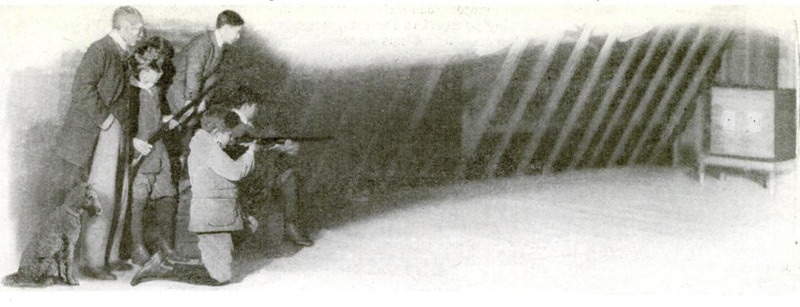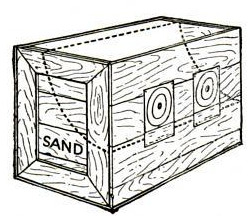A homemade bullet catcher for indoor use
Contenuto
-
Titolo
-
A homemade bullet catcher for indoor use
-
Article Title and/or Image Caption
-
Title: A safe bullet catcher for indoor use
-
Subtitle: In standard use among the W. J. R. C. boys
-
extracted text
-
ONE of the safest bullet
catchers to use in
shooting is likewise
the easiest to make, as proved
by the number in use among
Winchester Junior Rifle Corps
boys.
It’s just this, a packing box
banked up on the inside with
sand.
This sand is what will stop
your bullets. It should be very fine—no large
stones. Fill the box as shown in the illustration.
Bank it up to the top at the back and let it take
its natural angle of rest, that is, the slope at
which it stops sliding.
Now this makes the best possible backstop
for indoor or outdoor use. Sand stops a bullet
as nothing else will. Bags of sand are used on
the parapets of trenches to
stop the high velocity bullets
of the a army rifle.
To take care of the oc-
casional wide shots of a
beginner, there should be a
larger backstop behind and
around the main bullet catch-
er. This can be made of a
large sheet of boiler plate—
34 inch thick and Hii 4
fect by 4 feet. This must be
covered over with boarding
at least 74 inch thick to keep
the bullets from rebounding.
With such an outfit as this,
you can shdot with perfect
safety in your back yard, or
if vou lve in the city. in
your cellar or attic. You can enjoy in good
or bad weather the fine sport of rifle
shooting which every boy longs for and
never OUtgrows.
Start a W. J. R. C. “Unit”
The job of finding a place to shoot, rigging up
a range and getting your rifles is always easier
and cheaper when oo have a bunch of your
chums in on it. There’s more fun, too, in the
actual shooting when there are other fellows
to compete with.
So why not get together with half a dozen of
your chums, join the Winchester Junior Rifle
Corps and organize a regular Unit or Club
which will be officially recognized at National
Headquarters. Any boy who gets a Unit
started gets a Special Service Pin.
The W.J.R.C. will help you from start to finish
in rigging up your range and in
putting it on a paying basis.
The W.J.R.C. gives you all
the instruction necessary to
become a real expert in the
use of a rifle. It provides for
officers, supervisors, instruc-
tors to make your shooting
safe.
It costs you nothing to
join the WIRE There are
no dues and no military obli-
gations whatsoever. The
W.J.R.C. was organized sole-
ly to encourage better marks-
manship and better sports-
manship among boys and
girls x America. It is in-
tended to develop the quali-
ties of fair play and manliness which are
essential to success in after life. Any boy or
girl not over 18 and who is in good standing
in his or her community is eligible.
Membership in Sl C. covers the entire
United States. There is hardly a town now that
has not at least a small “Unit” of the big Na-
tional Organization, where boys are learning
to become expert riflemen and are competing
among themselves for the famous Winches-
ter Marksman and Sharpshooter Medals.
You, too, can earn these trophies of marks-
manship if you join the W.J.R.C. and start
shooting now.
Get the official plan and
handbook
Write today for Winchester
Junior Rifle Corps “Plan for
Organizing a W.J.R.C. Unit,”
and for the official hand-book
—*“Rules of the Winchester
Junior Rifle Corps” and
“How to Handle a Rifle
Safely.” This booklet tells
you all about the W.J.R.C..
and describes in detail the
fine points of shooting —
alignment of sights, the 3
correct positions, rules for gun safety, the care
of rifles, and the proper rifle for you to use.
If you are a boy scout, give your name in
full, the troop you belong to pt the name of
the scout master. If you are not a boy scout,
state what boy organization, if any, you be-
long to, giving the name of the official in charge.
-
Lingua
-
eng
-
Data di rilascio
-
1919-03
-
pagine
-
83
-
Diritti
-
Public domain (Google digitized)
-
Archived by
-
Davide Donà
-
Marco Bortolami (editor)



